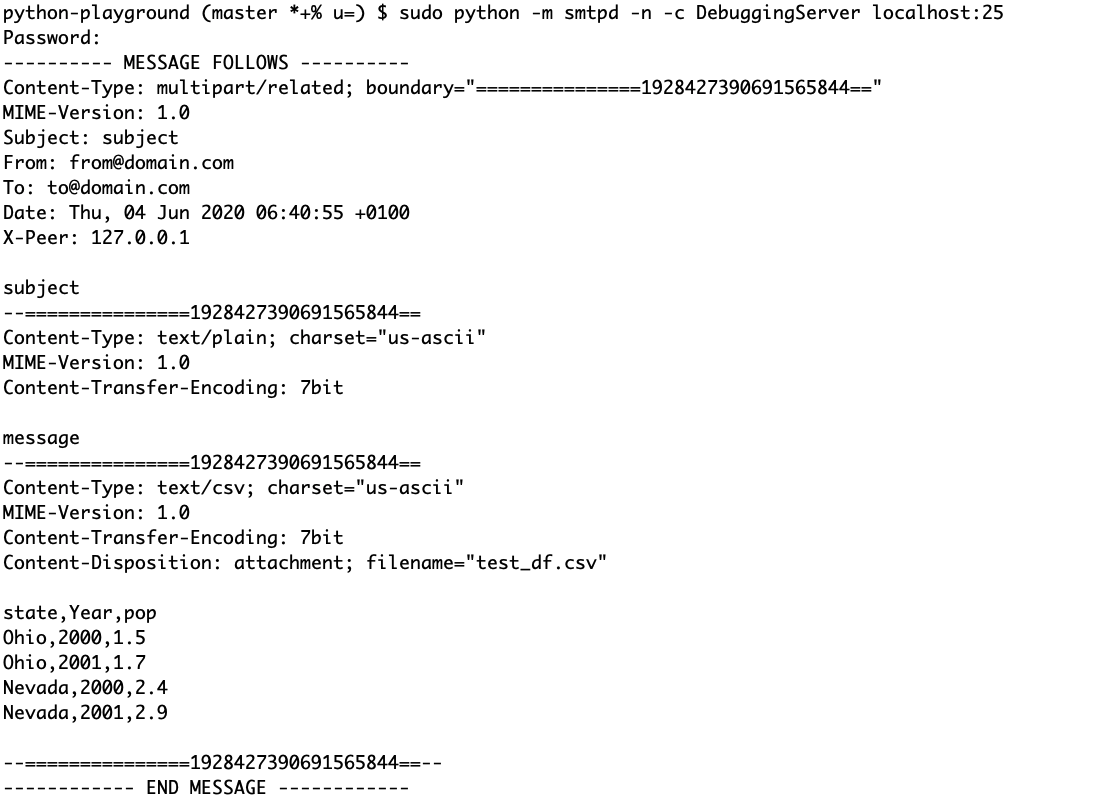Imagine that we need to deliver some specific dashboards or report frequently, it’s more convenient to send them automatically rather than manually. In this blog I’ll talk about how to send an e-mail with Python in the following points:
- Setting up a fake SMTP server with Python
- Sending e-mails with Python
- Test sending e-mails with unittest.mock
Setting up a fake SMTP server with Python
sudo python -m smtpd -n -c DebuggingServer localhost:25-m mod: run library module as a script (terminates option list)-c cmd: program passed in as string (terminates option list)
This command helps us to create a new debugging server, the messages will be discarded, and printed on stdout.
We use sudo in this case because we’re using port 25, if you don’t want that
you can use a port higher than 1024.
Sending e-mails with Python
# sending_mail_by_python/sending_mail.py
from mailer import Message
import smtplib
def build_email(from_address, to_address, subject, content, attach_rpt):
message = Message()
message.From = from_address
message.To = to_address
message.Subject = subject
message.Body = content
message.attach(attach_rpt, mimetype='text/csv', charset='us-ascii')
return message
def send_email(msg, host='', port=0):
s = smtplib.SMTP(host, port, local_hostname="smtp.mydomain.com")
result = s.sendmail(msg.From, msg.To, msg.as_string())
s.quit()
return resultFor building mail, I created the build_email() function with mailer module
to specify the sender, the destination, the subject, mail’s content, and
attachment if you want. For sending mail by SMTP, I created the send_email()
function with smtplib module. I firstly created an SMTP instance that
encapsulates an SMTP connection with smtplib.SMTP, assigning host, port
and local_hostname; then sending mail with this instance; exit when it
finished.
If you want to send an E-mail from “from@domain.com” to “to@domain.com”, with
“subject” as the subject, “message” as the content and “test_df.csv” as the
attachment, using the SMTP instance “localhost:25”, you can do like:
msg = build_email('from@domain.com', ['to@domain.com'],
'subject', 'message', 'test_df.csv')
send_email(msg, 'localhost', 25)Then you will get the following result in you terminal:

Test sending e-mails with unittest.mock
Mocking the SMTP instance means we replace the original SMTP instance with
a mock, then we will test the functions above with it.
import unittest
from unittest.mock import patch, call
from sending_mail_by_python import sending_mail as target
class SendEmailTests(unittest.TestCase):
def test_send_email(self):
with patch("smtplib.SMTP") as smtp:
from_address = "from@domain.com"
to_address = ["to@domain.com"]
msg = target.build_email(
from_address, to_address, "subject", "message")
target.send_email(msg)
# Get instance of mocked SMTP object
instance = smtp.return_valueAt the beginning of the test, I applied unittest.mock.patch() as a context
manager to mock the smtplib.SMTP class; then the elements for sending E-mail
are specified. Since I’ve mocked the SMTP, there is no more need to detail
the host and port. Before testing, I retrieved the instance of mocked SMTP
object, which will be used in the following tests.
# Checks the mock has been called at least one time
self.assertTrue(instance.sendmail.called)
# Check the mock has been called only once
self.assertEqual(instance.sendmail.call_count, 1)Now, let’s test! I first tested if the mocked SMTP instance is called and only called once.
# Check built e-mail elements
self.assertEqual(msg.From, from_address)
self.assertEqual(msg.To, to_address)
# Check sent e-mail elements
self.assertEqual(instance.sendmail.mock_calls[0][1][0],
from_address)
self.assertEqual(instance.sendmail.mock_calls[0][1][1], to_address)Then check the E-mail’s elements are correspond with the assignment. If you want
to test the functions with attachment, you can check like
self.assertEqual(msg.attachments[0][0], 'test_df.csv').
# Check the mock has been called ONLY once the given arguments and
# keywords
instance.sendmail.assert_called_once_with(msg.From,
msg.To,
msg.as_string())Moreover, we can also check if sendmail() has been called only once with the
given arguments by assert_called_once_with().
# Check the mock' calls are equal to a specific list of calls in a
# specific order
self.assertEqual(instance.sendmail.mock_calls,
[call(msg.From, msg.To, msg.as_string())]We can check the mock’ calls are equal to a specific list of calls in a specific order as well.
Reference
- Daniele Esposti, “Mocking objects in unit tests”, expobrain.net. [Online]. Available: https://expobrain.net/2013/08/27/mocking-objects-in-unit-tests/
- Stuart Colville, “Fake SMTP server with Python”, muffinresearch.co.uk. [Online]. Available: https://muffinresearch.co.uk/fake-smtp-server-with-python/
- “How to setup a fake SMTP server to catch all mails?”, serverfault.com. [Online]. Available: https://serverfault.com/questions/207619/how-to-setup-a-fake-smtp-server-to-catch-all-mails
- “smtpd — SMTP Server”, docs.python.org. [Online]. Available: https://docs.python.org/3/library/smtpd.html#debuggingserver-objects
- “send email via hotmail in python”, stackoverflow.com. [Online]. Available: https://stackoverflow.com/questions/13411486/send-email-via-hotmail-in-python
- “unittest.mock — mock object library”, docs.python.org. [Online]. Available: https://docs.python.org/3/library/unittest.mock.html
- “10.1.2 What information is listed”, www.gnu.org. [Online]. Available: http://www.gnu.org/software/coreutils/manual/html_node/What-information-is-listed.html#What-information-is-listed
- ribkhan, “Email newsletter marketing online”, pixabay.com. [Online]. Available: https://pixabay.com/illustrations/email-newsletter-marketing-online-3249062/